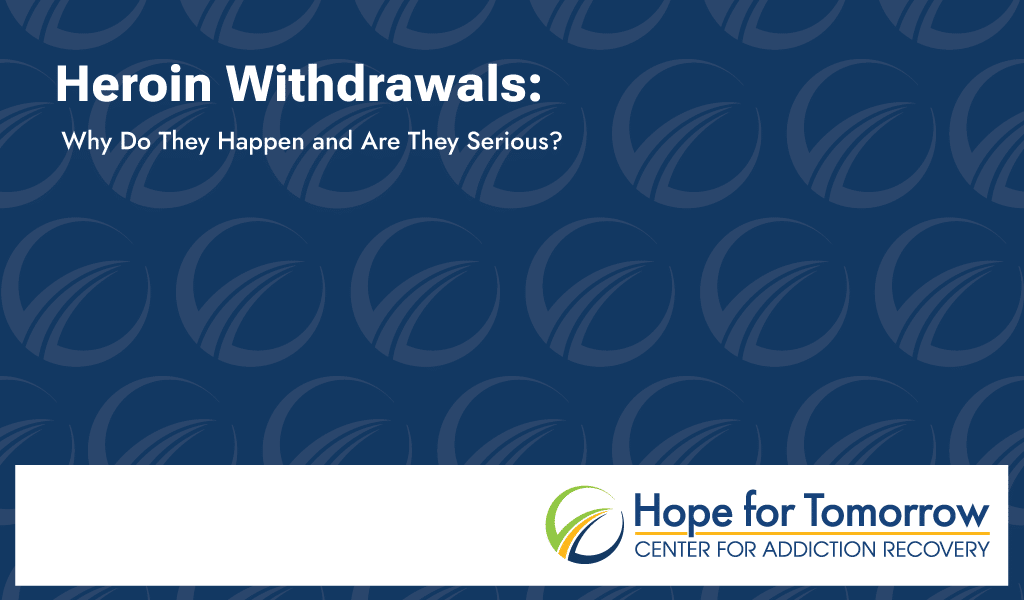

You’ve probably experienced a nasty flu before. Everyone knows the unpleasant chills, muscle aches, headaches, and nausea that come with it. Less people are familiar with heroin withdrawals, even though the two often feel similar.
Around 9,000 West Virginians used heroin in 2019, but not all of them went on to develop a heroin use disorder and experience withdrawal. Plenty of people do. Maybe you’re one of them. Hope for Tomorrow works with people from all walks of life to help them through withdrawal and guide them to recovery from heroin dependence. We know firsthand how exhausting and scary heroin withdrawal can be.
Curious about heroin withdrawal? You’ve come to the right place.
Heroin withdrawal happens when your body has grown so used to heroin in your system that it doesn’t know what to do without it. When you go a while without using heroin, you’ll start experiencing withdrawal symptoms as your body tries to adjust.
When you take heroin, it rushes to your brain and attaches to its opioid receptors. Your brain releases dopamine, a feel-good neurotransmitter, in response. This induces the sought-after euphoria that comes with heroin, and because it’s human nature to seek pleasure, it’s easy to want to use heroin again to feel that way again.
Because heroin is stronger than the brain’s natural opioids, it dulls your natural opioid response This makes heroin less pleasurable with continued use, requiring you to use more heroin to receive the same effects you did the first time. This is called tolerance.
When a person develops tolerance to heroin, it means the brain has changed due to its presence. Certain neurons become more active to offset heroin’s relaxing, sedative nature. When heroin isn’t present in the body, those neurons are still just as active – they just don’t have heroin’s calming effect to level them out anymore. The adjustment back to normal levels of activity and the side effects that come from it are known as withdrawal.

The severity of heroin withdrawal symptoms depends on how much heroin you’ve taken, and how long or often you’ve taken it. People who consume heroin more often tend to have a more painful withdrawal process.
No matter how awful they feel, heroin withdrawal symptoms themselves are rarely life-threatening. Dehydration due to vomiting and diarrhea is the biggest concern. What symptoms are mild, moderate, and severe varies from person to person.
Common heroin withdrawal symptoms include:
Because the surges of dopamine that come with heroin are so intense, it’s like nothing else compares – especially after you use heroin for a long time. Your brain becomes less sensitive to regular pleasurable activities and needs the substance’s dopamine surges to activate the reward system and find that satisfaction. This creates the cravings that come when you don’t take heroin, and cravings paired with withdrawal make quitting on your own hard.
The length of heroin withdrawal depends on each individual, their physical condition, and other substances and medications they take. Symptoms tend to start around eight hours after the last dose, though, and usually last between seven and ten days. Some of the symptoms of withdrawing from heroin can last longer in people, but it’s important to note that with treatment, withdrawal symptoms can be safely and effectively managed and prevented long-term.

Withdrawal is unpleasant to deal with on your own – so what do you do?
Heroin addiction treatment is a good choice. It’s a big step to take, but entering a detox program will help you through the heroin withdrawal process safely and effectively.
Most facilities can utilize buprenorphine to help manage symptoms and cravings, too, with Hope for Tomorrow included. Buprenorphine is FDA-approved to treat opioid use disorders and is an opioid itself, but far weaker than heroin and other substances. It’ll lessen withdrawal symptoms and enable you to focus on therapy and other treatments that will help you overcome your heroin use disorder altogether.
Heroin rehab at Hope for Tomorrow enables you to break free of the difficult cycle of heroin use and withdrawal. Our passionate, empathetic staff will empower you to address both your heroin use disorder and any mental health concerns that likely come alongside it in our dual-diagnosis approach. We treat every patient with compassion and respect, and we’re serious about providing hope and help to anyone in need. If that’s you, call us at 877-679-8162 today to get started on your journey to recovery.